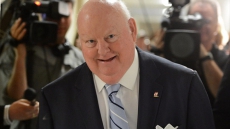TORONTO — Patients at a Hamilton hospital can now easily spend time with their pets thanks to a unique initiative that was prompted by a local woman's promise to her dying nephew.
The program — Zachary's Paws for Healing — was launched by Donna Jenkins and is named after her nephew, who died last year after being diagnosed with Hodgkin's lymphoma.
Zachary Noble longed for a visit from his dog while he was in the Juravinski Hospital and was allowed one with the help of his medical team. Before he died, Noble made his aunt, who was his caregiver, promise that she'd work with the hospital to establish a program for companion pet visits with patients.
"If it wasn't for the insight of that young man who was 25 years old and autistic to empathize with the other patients around him, this may have never happened," Jenkins told The Canadian Press. "It's so good to know that we're bringing some comfort and some joy."
Many hospitals, including Juravinski, already have policies on pet visits but the requirements to make them happen are so arduous for families and medical staff that they often aren't pursued, said Jenkins. That's where her organization comes in.
"It's too cumbersome in order to meet all the infectious control procedures and get all the legal paperwork signed ... our organization realized that," said the 64-year-old. "We do all the leg work, we do all the paperwork, we do all the contacting for the families."
After her nephew's death, Jenkins worked with a committee at the Juravinski Hospital to develop the program. It launched in September, initially only providing pet visits to patients in certain intensive and long-term care units. Two weeks ago, however, the program expanded to the entire hospital.
"They were willing to be the first hospital in Canada to offer this type of specialized patient-pet visitation program because they realized how important it is to their patients," Jenkins said.
The program is currently limited to dogs and cats, but could expand to include other animals. Patients are allowed weekly visits from their pets, who are transported in a large, covered rolling crate accompanied by a volunteer. Urgent end-of-life visits are available for those who want to see their pets one last time.
The program also offers to foster pets for patients who aren't able to find caregivers for their animals while in hospital, said Jenkins, recalling a case where a man once refused a stem cell transplant because he hadn't been able to find someone to care for his pet.
While the program has only been running for three months, Jenkins said she hopes it can grow.
"It would be my hope that every hospital in Canada would have this opportunity for its patients," said Jenkins, whose organization is putting together a kit to help other hospitals develop similar programs.
For the Juravinski Hospital, Zachary's Paws for Healing has had a significant impact on patient spirits.
"It allows our patients and families to have their own pet visit them during a very difficult time in their lives," said Karen Robinson, the hospital's clinical manager of oncology. "It's helped them remember how important it is to get home."
Robinson, whose unit was among the first to try the program, said patients have been "very appreciative" of the service, which has removed a great burden from medical staff, who were previously the ones responsible for ensuring any visiting pets met safety requirements.
"We really have a lot of increased visits because Zachary's Paws orchestrates the entire thing," she said. "It's wonderful for the staff knowing that the patients are really pleased and it's wonderful for the patients and families."





